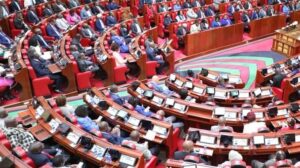Controversial political analyst Mutahi Ngunyi has once again stirred the waters of Kenyan politics with his latest commentary on the much-anticipated ‘Nane Nane’ protests.
The protests, which were expected to be the “mother of all protests,” seemingly flopped, according to Ngunyi’s cryptic post on social media.
His assertion that the protests were orchestrated by a high-level insider within President William Ruto’s government has raised eyebrows across the political spectrum.
Ngunyi’s remarks come at a time when Kenya’s Gen Z, the young and restless generation, took to the streets to demand better governance and accountability from President William Ruto’s administration.
The young protestors have been vocal about the rising cost of living and the soaring unemployment rates, issues that have deeply affected their livelihoods.
The ‘Nane Nane’ protests were expected to be a significant show of force, symbolizing the frustration and discontent brewing among the youth.
However, according to Ngunyi, these protests did not meet expectations.
In his social media post, Ngunyi suggested that the protests’ failure was due to manipulation from within the state apparatus.
He hinted that the entire movement had been influenced by forces within the government, thereby undermining its potential impact.
Ngunyi’s claim that the protests were controlled by a state insider suggests a level of political intrigue that many had not anticipated.
Despite the apparent failure of the ‘Nane Nane’ protests, Ngunyi warned that this might not be the end of the story.
He suggested that the “owner of the revolution” is regrouping and may attempt another uprising in the near future.
“Public Notice: The owner of the revolution is a state Insider. And he is re-grouping. That is why 88 Failed today,” Ngunyi posted.
His comments have sparked a wide range of reactions.
Supporters of the government see it as a confirmation of the state’s resilience and control, while critics argue that it reveals deep-seated issues within the government.
Ngunyi’s analysis also opens up the question of whether future protests will be similarly influenced or if the youth will find a way to express their dissatisfaction more effectively.
Ngunyi’s reputation as a sharp political analyst and his role in shaping the “tyranny of numbers” narrative during past elections adds weight to his claims.
His suggestion that the protests’ failure was not organic but rather orchestrated raises concerns about the authenticity of public dissent and the state’s role in managing or even manipulating such movements.
The debate over the legitimacy and effectiveness of protests like ‘Nane Nane’ will likely continue.
Whether or not another wave of protests will emerge, as Ngunyi predicts, remains to be seen.
What is clear, however, is that the politics in Kenya remains as complex and unpredictable as ever.





















Add Comment